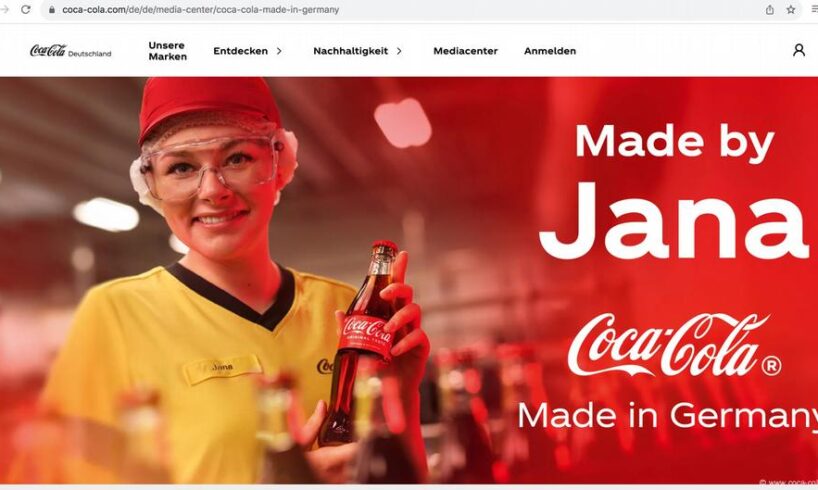
For decades, US firms have enjoyed a strong foothold in Germany, particularly in the country’s western regions that were under the control of the Western Allies after World War II.
In the immediate postwar years, US cigarettes were so highly prized on the German black market that they effectively served as currency.
Sports stars often played a role in cementing trans-Atlantic brand power. Former heavyweight boxing champion Max Schmeling, seen by many US citizens as a “good German,” went on to represent Coca-Cola in Germany after his career in the ring.
Decades later, East German boxing champion Henry Maske ran McDonald’s franchises in the German cities of Cologne and Leverkusen.
Today, however, the climate has shifted. The image of the US in Germany has taken a major beating, raising questions about how US companies can maintain their reputation. Some US firms are now actively marketing their products as “Made in Germany.”
For decades, US brands enjoyed an unassailable image in GermanyImage: picture alliance / dpa
The McDonald’s experience
The phrase “Made in Germany” was originally introduced by Britain’s parliament in 1887 to warn consumers about supposedly inferior German goods. But the move backfired because the label quickly became a mark of quality.
Recent German media coverage has suggested that US brands are counting on the positive connotations of the label to strengthen their position in Europe’s largest market. Some, like McDonald’s, Germany’s largest fast-food chain, have been emphasizing their significant German sourcing.
The company told DW in a statement that it sees itself as “a long-standing partner of German agriculture” and “a reliable part of everyday life for many people in Germany.”
Fast-food company McDonald’s hopes to evade consumer wrath by emphasizing its German sourcingImage: picture-alliance/dpa/B. von Jutrczenka
McDonald’s emphasized its use of domestic supply chains, noting that 65% of its raw materials come from Germany, with pork, beef, eggs, cream, and cucumbers sourced entirely locally.
“This approach is not new for us in the German market,” the company said, though the broader trend suggests US firms are increasingly tailoring their image to specific international audiences.
Pushback beyond Germany
Tesla may be the clearest case of how brand perception can shift. Tesla CEO Elon Musk’s political leanings and vocal as well as financial support for US President Donald Trump have made him one of the most polarizing figures in business.
Around the world, Tesla owners have even placed stickers on their cars reading: “I bought this before Elon went crazy.”
The backlash has had real consequences. Tesla is not longer among the top 10 bestselling electric vehicles in Germany, underscoring the power of consumer sentiment.
Elon Musk’s political leanings have hurt Tesla sales in EuropeImage: Benoit Tessier/REUTERS
Skepticism toward US goods isn’t limited to Germany, Europe’s biggest economy. In Canada, calls to boycott US products are also on the rise, with labels such as “Made in Canada” and “Prepared in Canada” used to steer consumer choices.
Even food giant Heinz, a quintessentially US brand, now promotes a ketchup made with Canadian tomatoes and peanut butter from Canadian-processed peanuts.
Denmark has gone a step further. Since Trump’s proposal to buy Greenland, Danish retailers have marked European alternatives to US goods with black stars on price tags.
Beverage giant Carlsberg, which bottles Coca-Cola in Denmark, has already reported declining sales linked to consumer boycotts.
Coca-Cola’s ‘Germany Strategy’
Coca-Cola, perhaps more than any other US brand, appears concerned about being tied to the US government’s politics.
The Atlanta-based company recently launched a “Made in Germany” campaign in Germany, which highlights the names of employees such as Daniel, Heike, Jana, Jessy, and Muhammed. Each is featured under the slogan: “Made by [employee name]. Made in Germany.”
“The campaign aims to show Coca-Cola’s deep roots in Germany,” the company told DW in a statement, noting that the company had been part of German business and society for almost 100 years.
According to the company, many Germans are unaware that most Coca-Cola sold in the country is already bottled locally.
Given the current political climate, the move is widely seen as an attempt to distance the brand from US politics.
This article was originally written in German.





